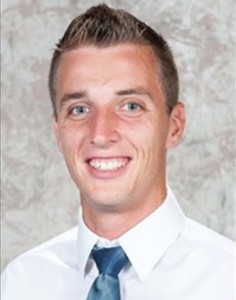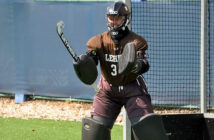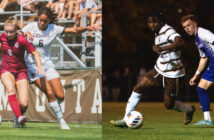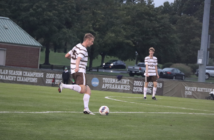After a three-year Mormon mission in the Pacific Island of Kiribati, junior International Relations major Austin Decker is back as a striker on the Lehigh men’s soccer team and is looking to contribute as a leading scorer this season.
Decker considered his return the afternoon before his first game back as a fresh start with the team.
“It feels like you almost didn’t leave; it’s kind of like a dream almost. It’s like two years and I come and everything is like it was,” Decker said.
During his first two years at Lehigh, the Iowa City native was certainly an impact player for the Mountain Hawks, starting in 28 of the 32 games he played in, scoring eight goals and earning 17 points. After his sophomore year — the 2010-2011 academic year — he felt compelled to complete his two-year Mormon mission.
Decker says he felt, “super blessed” to have the opportunity to complete the mission.
“I wasn’t really giving back like I should have,” he added. “I feel like anybody who has been given the stuff that they have (should give back). I’ve been blessed that way; it is only right to give back, to serve others.”
Soon after he decided to do this, he contacted Lehigh’s soccer coach Dean Koski. Koski was under no expectation that Decker would commit to the trip, but he was immediately supportive of the decision.
“He asked me what my thoughts were and I said, ‘Look Austin, if this is something you want to do, if it’s important to you and important to your faith and important to what the church wants you to do, then go do it,’” Koski said.
Other members of the soccer team were likewise supportive and understanding of his mission. Koski said that he and Decker had done the necessary research, which indicated that the NCAA would allow him to defer the remainder of his eligibility by two years for him to do his mission and resume playing upon his return. Senior Ciaran Nugent, the only player still on the team to have played with Decker before he left for his mission, said that Decker did not break the news to the team, and that they players instead learned from the coaches after Decker made the decision to go on his mission.
While Decker thought he would be sent to Asia because of his Chinese minor, he had no idea he would be sent to Kiribati – a small Pacific nation comprised of several islands near Fiji on the equator. Since Kiribati is such a small nation, his training was general at the Missionary Training Center without much preparation for the small country.
He arrived in Kiribati on Nov. 16, 2011, and just as he began getting settled into the country and its culture, he contracted an intestinal illness as a result of foods he was not used to eating. Decker had to return to Iowa for treatment on Feb. 2, 2012, where he remained until he was able to return to Kiribati on Aug. 22, 2012. This illness meant he had to defer his eligibility with the NCAA another year in order to finish the remaining time on his mission.
Decker’s mission in Kiribati went beyond preaching the gospel. He participated in service projects around the islands such as digging wells, building huts and seawalls, and collecting food. He found the people of Kiribati very open, receptive and willing to listen to him and other missions of the Church of Jesus Christ of Latter-Day Saints.
“The goal isn’t to convert as many people as possible,” Decker said in regards to what he feels is a common misconception on the role of missionaries. “The goal is to help as many people (as possible) and to speak (about the Church), and it is up to them whether they accept it or deny it.”
While there, he lived in huts and had several companions as he moved around the islands of Kiribati. As per rules of the missionary, he was only able to call home on Christmas Day and Mother’s Day, but he regularly stayed in contact with home via email.
“The most rewarding part, I believe, was two-fold,” Decker said. “One was me growing into a better person. It was me growing, maturing, realizing who I am, what I want to do and kind of using myself to (serve) others; it helps you understand what you need to do in life and what you want to do. So one of the most rewarding parts was for me to become a better person, and that came because it was so rewarding to help other people.”
In this spirit, Decker hopes to pursue a career as a Foreign Service Officer after graduation.
Decker says that the mission helped him understand his priorities and what it means to commit to something and to work towards a goal. Upon his May 5, 2014 return to the United States, he made it an immediate priority to return to aspects of American normality such as family, television, carpeting and paved roads. He also made it a priority to get back into game shape, working out regularly with the training staff at Lehigh to help regain the strength and conditioning needed for a soccer season.
Senior midfielder and defender Ali Famili said Decker’s speed and ability to score goals should help the team in areas they greatly struggled in during his absence. In fact, Coach Koski expects him to score six goals this season, one more than the entire team scored last season. Decker said that his first goal on Sept. 1 against Monmouth University came as a big relief for him.
Nugent, who played with Decker as a first-year when Decker was a sophomore, said Decker returned to the team as “the same kid; plus, he’s developed more awareness about everyone else around him.”
Famili and Nugent both agree that upon his return, he has been a quiet leader in the locker room. They said Decker’s Mormon faith really does not come up and that the team is understanding of the various aspects of Decker’s faith, such as his choice to not drink alcohol. Decker said that while he was used to being the only Mormon, living in Iowa and going to boarding school in Minnesota, his faith has not been an issue at all and that he has a great understanding with his teammates.






Comment policy
Comments posted to The Brown and White website are reviewed by a moderator before being approved. Incendiary speech or harassing language, including comments targeted at individuals, may be deemed unacceptable and not published. Spam and other soliciting will also be declined.
The Brown and White also reserves the right to not publish entirely anonymous comments.